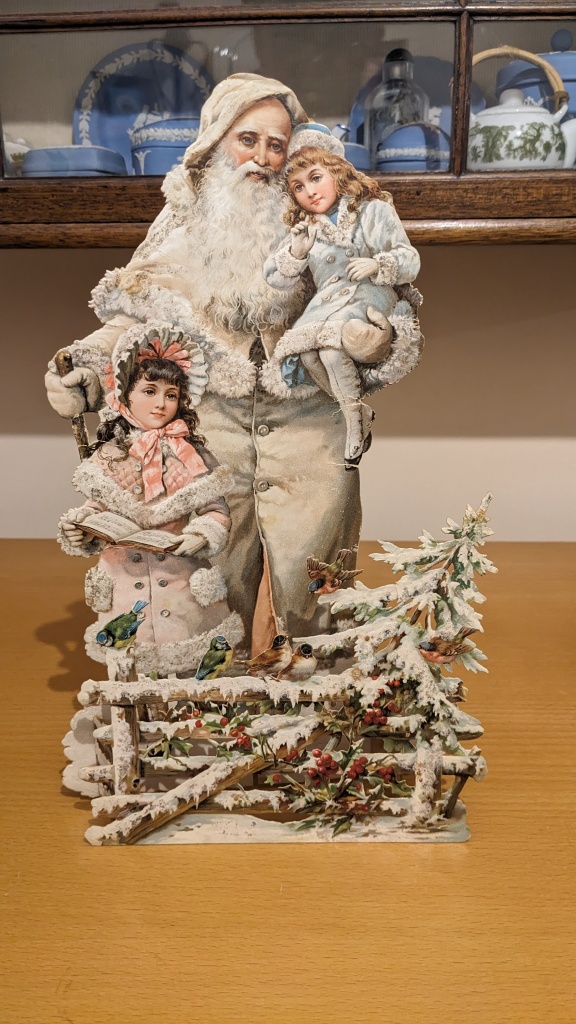A few days ago, I was visiting the church in the tiny village of Hilton, when I discovered a remarkable relic of a crime that no longer exists.
This crime, which no longer exists, as the ‘need’ for it has vanished, was body snatching. During the eighteenth century medicine made rapid process in one area in particular, anatomy. The structure of the human body was understood as never before, and whilst there were wonderful drawings and models of the human body available, everybody recognised that medical students needed hands on experience of the structure of the human body. Indeed the Royal College of Surgeons required that a student had to have been present at the dissection of at least two cadavers, before he could qualify.
There was only one legal source of bodies for dissection, persons executed for felonies, of which there weren’t that many and also those bodies were only available to the Royal College school. Because there were many people who wanted to be doctors and surgeons, a large number of private schools were set up, and they needed bodies for dissection, for these schools there was only one possible source, the body snatchers or resurrection men.
These men (there were women involved in the trade, but they tended to be lodging house keepers who sold the bodies of people who died in their house) opened graves of newly buried people, removed the bodies and took them to the medical schools. They operated in a curious grey area of the law, as if they were not caught actually digging up the grave, and only took the body, they could escape prosecution, as the body couldn’t belong to anybody. A person couldn’t be owned when alive, so their corpse couldn’t be owned when dead.
Professional resurrectionists could exhume several bodies a night, and leave the graves as tidy as they were before, but even the overcrowded churchyards of the cities could not provide enough corpses to satisfy the needs of the medical schools. Graves were opened in more rural areas, a body could be tightly bound and made to fit in a container little over two feet square, placed on a stage coach and be in London in only a day or so at most.
The trade ended in 1832, with the passing of the Anatomy Act, medical schools were now licensed, and a supply of subjects for dissection was made available to trainee doctors. The former resurrection men found themselves without a job, loathed by the public, and most died in poverty.
So what was it I found in a churchyard in Dorset?
People were understandably worried about the possibility of their relatives bodies being stolen. So, in many places, they tried to prevent this. The simplest, and least efficient, was to employ someone to watch the graveyard, in some paces special buildings were made to provide shelter for the watchmen. Unfortunately watchmen could be bribed, or given generous presents of spirits so they slept through the robbery. Indeed many professional resurrectionists were originally watchmen, who had been dismissed for letting too many bodies be stolen
If you could afford it you took the matter into your own hands since, to steal a body.
A small opening was dug down to the head of the coffin, which was then broken open, and the body was pulled up with a rope, fastened either round the neck or under the armpits. (from The Diary of a Resurrectionist 1811-1812, by James Blake Bailey, published 1896)
There were three main ways of protecting a body, first use an iron coffin, it was impossible to get into, but had two drawbacks, first they were very expensive, second they were unpopular with the managers of graveyards as they would never rot, and make it impossible to ever reuse the burial plot.
Second the corpse was firmly attached to the coffin, usually by iron bands bolted over the body.
And the third method, this is what I found in the churchyard at Hilton. A metal cage, over the grave. This was called a Mortsafe, it was driven into the ground around and over the coffin. This one probably belonged to the parish, it would be placed over a new grave, and left there until the next burial which, in a small parish would probably be several months later, when it would be lifted and placed over the next burial.
In 1848, the date on the gravestone, it was used for the last time. Body snatching was now a thing of the past, and so it was never reused and remains, a rare relic of a, happily, forgotten crime.












































